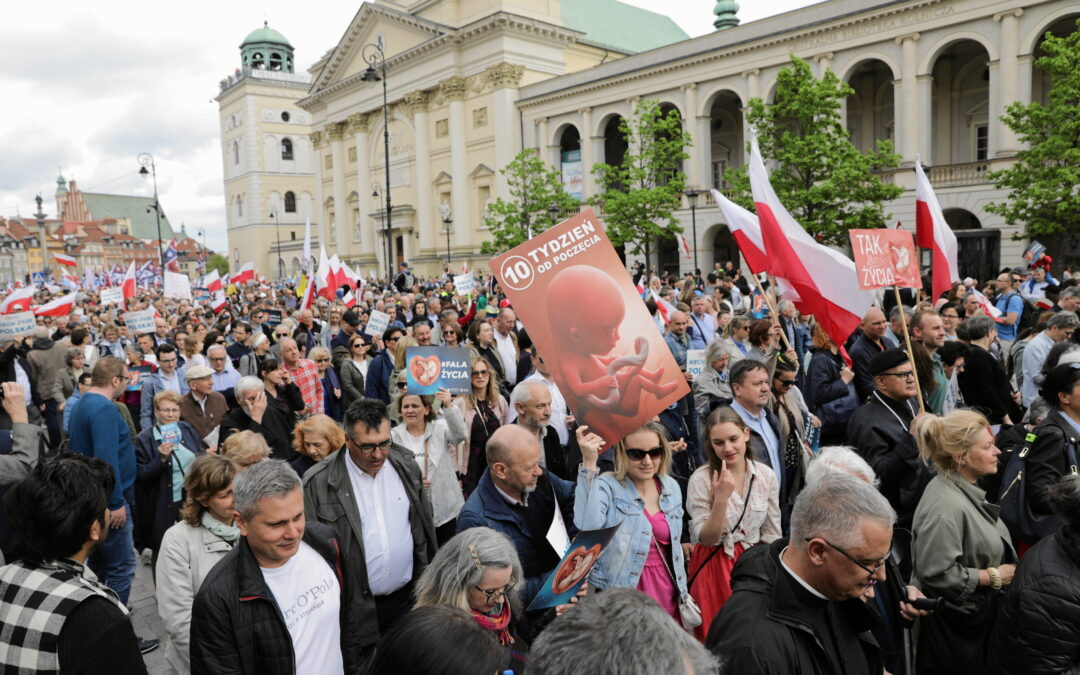Tens of thousands of people joined an anti-abortion March of Life in Warsaw two days after parliament gave initial approval to legislation that would soften Poland’s strict abortion laws.
“We want every Polish citizen to have the right to life from conception to natural death,” one of the organisers, Bogusław Kiernicki, told the crowd as they gathered on Castle Square in Warsaw’s old town. “It is not an [act of] grace that we allow a child to be born; it is their sacred right.”
Participants waved red-and-white Polish flags as well as banners declaring “Everyone has the right to life” and “This is Poland, not Brussels, no one supports abortion”.
Wg organizatorów Narodowy Marsz Życia 2024 zgromadził ponad 50000 osób!
Była to największa 🇵🇱 manifestacja za życiem w XXI wieku!
Możemy być dumni, że tam byliśmy! pic.twitter.com/ReYP31QuIG
— Afirmacja (@Afirmacja_info) April 14, 2024
The march took place on Sunday and followed Friday’s votes by the Sejm, the more powerful lower house of parliament, in favour of further legislative work on bills aimed at ending Poland’s near-total abortion ban.
Organisers estimate that 50,000 people attended the march yesterday, which they said makes it the largest Polish pro-life gathering in the 21st century. Two years ago, attendance at a March of Life and Family in Warsaw was declared to be around 10,000.
“We will not raise the white flag regardless of what happens in the Sejm,” said Kiernicki, quoted by news website Onet. “We will continue until the rights of conceived children are guaranteed. We will be here next year, and maybe in six months, if necessary.”
Narodowy Marsz Życia. Wielka radość i satysfakcja, że byliśmy tam. pic.twitter.com/kakLFlV9Hu
— Jacek Kowalski (@Korabita) April 14, 2024
Among those to attend the march were representatives of Confederation (Konfederacja), a far-right group that on Friday voted against all of the bills proposing to soften the abortion law.
“We are here to [help women] eliminate their fear, not their child,” declared Confederation MP Karina Bosak, who attended the march with her husband, one of Confederation’s leaders, and their three children. She condemned the “radical feminists” who want to “omit men” from such decisions.
Patryk Jaki, an MEP from Sovereign Poland (Suwerenna Polska), another right-wing opposition party, also attended with his son, who has Down syndrome. That condition is one of those that, before the current near-total abortion ban, was grounds to terminate a pregnancy if it was diagnosed in the foetus.
“Poland and Europe are ruled by people who support the civilization of death,” Jaki told news website wPolityce. “They say the right to life is not a human right but so-called reproductive rights, i.e. the right to kill, are.”
Warszawą idzie #FalaŻycia
Życie to szczęście i przyszłość Polski. Życie to dobro i inwestycja w silną Ojczyznę. #MarszDlaŻycia pic.twitter.com/wqbNWhDhrF— Patryk Jaki – MEP (@PatrykJaki) April 14, 2024
Since 2021, under a constitutional court ruling issued the previous year, abortions in Poland have only been allowed in two circumstances: if a pregnancy threatens the mother’s life or health or if it results from a criminal act such as rape.
Under two of the bills put forward by groups in the current ruling coalition, abortion on demand would be introduced. A third, put forward by another coalition partner, would not go as fair, instead returning to the pre-2021 law.
That would mean that, in addition to the two above circumstances, abortions would also be allowed if a foetus was diagnosed with a severe birth defect.
Conservative opposition leader Jarosław Kaczyński has indicated he could support softening Poland’s near-total abortion ban, which was introduced under the rule of his PiS party.
But he warns this could only happen by changing the constitution https://t.co/LtHr6OiAwE
— Notes from Poland 🇵🇱 (@notesfrompoland) April 14, 2024
However, introducing any of those bills will be a challenge given differences within the ruling coalition as well as the veto power of conservative President Andrzej Duda and the possibility that the constitutional court could overturn any more liberal abortion law.
Opinion polls show that there is strong public support for removing the current near-total ban. However, society is divided over whether there should be a return to the pre-2021 law or instead the introduction of abortion on demand.
Some politicians from the ruling coalition have called for a referendum to decide the issue, though others have argued that abortion is not something that should be put to a public vote.
As parliament debates changing Poland's abortion law, a poll asked the public what MPs should do:
– 35%: legalise abortion on demand up to 12 weeks
– 21%: restore pre-2021 law
– 23%: call a referendum
– 14%: keep the current near-total banVia: https://t.co/HVfF56Kuw6 pic.twitter.com/90GTTaDi3u
— Notes from Poland 🇵🇱 (@notesfrompoland) April 12, 2024

Notes from Poland is run by a small editorial team and published by an independent, non-profit foundation that is funded through donations from our readers. We cannot do what we do without your support.
Main image credit: Mateusz Skwarczek / Agencja Wyborcza.pl

Daniel Tilles is editor-in-chief of Notes from Poland. He has written on Polish affairs for a wide range of publications, including Foreign Policy, POLITICO Europe, EUobserver and Dziennik Gazeta Prawna.



















